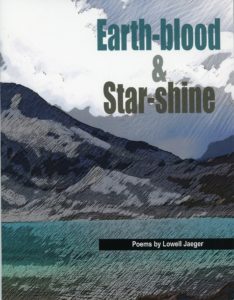
Eco-criticism has long explored divisions between nature and civilization, asking questions like: Where does nature begin and civilization end? How do they affect one another? These ideas are central to Montana Poet Laureate Lowell Jaeger, as evidenced in his four-part collection, Earth-blood & Star-shine.
I first met Jaeger more than a year ago when he gave a reading at a Thursday night meeting of Open Sky Sangha, a weekly Buddhist meditation gathering in Kalispell. As he read, all I could think was: These poems are Buddhist. Even without intending to be, they are; part of Jaeger’s strength is that his work is both profound and accessible. Written in conversational, yet descriptive and lyrical analogies, the poems comment upon life’s deeper truths without the use of lofty prose.
The collection’s titular four sections unfold in order. “Earth” offers a sort of call-and-response between humans and the natural world. It’s fueled by sharp observations of everyday events such as driving Montana backroads, wildlife watching, hiking, fishing, and scavenging for bones and other treasures among garbage heaps or rolling hills,
“Blood” manipulates violent diction with words like “death,” “miserable,” “wretchedness,” “splayed,” and “gnawed” to illustrate brutality and sacrifice, like killing a deer to feed a family. Nostalgia for radiant and tragic moments – a quiet snowstorm, a botched morning fishing trip with a young stepson – is the focus of “Star.” And the collection’s final section, “Shine,” sports irreverent poems such as “Mule Turds” and “Slapping the Octopi” that invoke the humor and absurdity of being alive.
Throughout the four luminous sections the author manipulates observations and metaphor to showcase all facets of human experience. Beyond the philosophical commentary is the invitation to witness and enjoy the gifts of the present moment.
One of Montana’s most prolific voices for decades, Jaeger adeptly proves in Earth-blood and Star-shine that poetry is still relevant in contemporary America.
– Brynn Cadigan